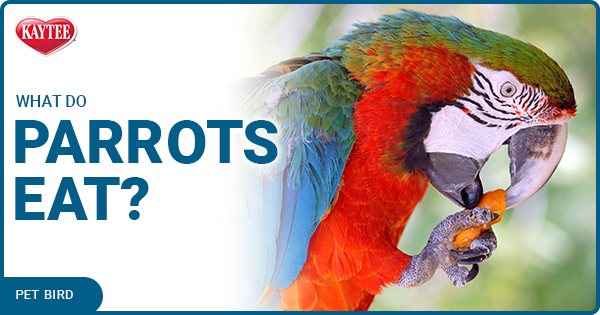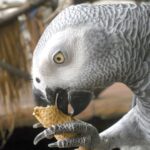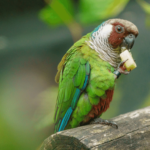Parrots can eat fruits, vegetables, seeds, and nuts. Avoid feeding them avocados, chocolate, and caffeine.
Parrots thrive on a varied diet rich in nutrients. Fresh fruits like apples, bananas, and berries provide essential vitamins. Vegetables such as carrots, broccoli, and spinach offer vital minerals and fiber. Seeds and nuts, including sunflower seeds and almonds, are excellent protein sources.
Ensure clean, fresh water is always available. Avoid toxic foods like avocados, chocolate, and caffeine, as they can harm parrots. A balanced diet ensures vibrant plumage, strong immunity, and overall well-being. Always consult a vet for specific dietary needs tailored to your parrot species. Proper nutrition is key to a happy, healthy parrot.
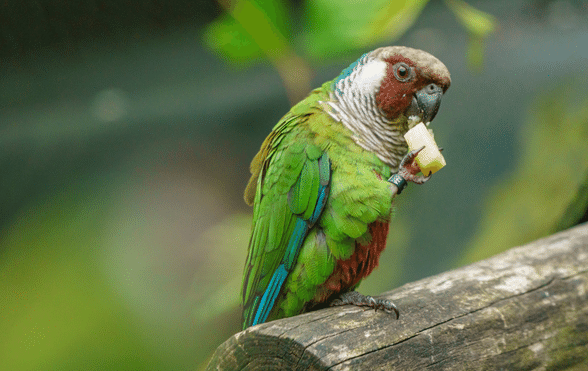
Credit: exoticdirect.co.uk
Introduction To Parrot Nutrition
Feeding your parrot the right food is essential for its health and happiness. Understanding what parrots can eat helps ensure they live long, vibrant lives.
Importance Of Diet
A balanced diet is crucial for parrots. Proper nutrition helps them maintain bright feathers and high energy levels. It also boosts their immune system, reducing the risk of diseases.
Parrots in the wild eat a variety of foods. Mimicking this diet at home keeps them healthy and happy.
Basic Nutritional Needs
Parrots require a mix of proteins, fats, vitamins, and minerals.
| Nutrient | Sources |
|---|---|
| Proteins | Legumes, eggs, and small amounts of lean meat |
| Fats | Nuts and seeds like sunflower and flaxseed |
| Vitamins | Fruits and vegetables such as carrots, spinach, and apples |
| Minerals | Cuttlefish bones for calcium, and mineral blocks |
- Proteins: Essential for growth and repair
- Fats: Provide energy and support cell functions
- Vitamins: Vital for overall health and well-being
- Minerals: Important for bone health and metabolic functions
Offering a varied diet ensures parrots get all the nutrients they need. Fresh fruits and vegetables should make up a significant part of their diet.
Seeds and nuts are good but should be given in moderation. Too many seeds can lead to obesity and nutritional imbalances.
Always provide fresh water to keep your parrot hydrated.

Credit: www.quora.com
Fresh Fruits For Parrots
Parrots love fresh fruits. Fruits provide essential vitamins and minerals. Not all fruits are safe for parrots. This guide helps you choose the right fruits.
Safe Fruits
Some fruits are perfect for parrots. These fruits give them energy and nutrients. Here are some safe fruits:
- Apples (remove seeds)
- Bananas
- Berries (strawberries, blueberries, raspberries)
- Grapes
- Melons (watermelon, cantaloupe, honeydew)
- Oranges (in moderation)
- Papaya
- Mango
- Pears
- Pineapple
Fruits To Avoid
Some fruits can harm parrots. These fruits contain toxins or are hard to digest. Avoid giving these fruits to your parrot:
- Avocado (toxic to parrots)
- Cherries (pits contain cyanide)
- Peaches (pits contain cyanide)
- Plums (pits contain cyanide)
- Tomatoes (leaves and stems are toxic)
| Safe Fruits | Fruits to Avoid |
|---|---|
| Apples | Avocado |
| Bananas | Cherries |
| Berries | Peaches |
| Grapes | Plums |
| Melons | Tomatoes |
Vegetables For Parrots
Feeding your parrot the right vegetables is crucial. Vegetables provide essential vitamins and minerals. But not all vegetables are safe for parrots. Let’s explore the healthy and harmful vegetables for your feathered friend.
Healthy Vegetables
Many vegetables are great for parrots. They offer essential nutrients. Here are some safe options:
- Carrots – Rich in vitamin A.
- Broccoli – Packed with vitamin C and fiber.
- Spinach – High in iron and calcium.
- Bell Peppers – Full of antioxidants.
| Vegetable | Benefits |
|---|---|
| Carrots | Rich in vitamin A |
| Broccoli | Packed with vitamin C and fiber |
| Spinach | High in iron and calcium |
| Bell Peppers | Full of antioxidants |
Harmful Vegetables
Some vegetables can be dangerous for parrots. Avoid feeding these to your parrot:
- Avocado – Contains persin, toxic to parrots.
- Onions – Can cause digestive issues.
- Garlic – Harmful to their health.
- Rhubarb – Contains oxalic acid, very toxic.
| Vegetable | Reason to Avoid |
|---|---|
| Avocado | Contains persin, toxic to parrots |
| Onions | Can cause digestive issues |
| Garlic | Harmful to their health |
| Rhubarb | Contains oxalic acid, very toxic |
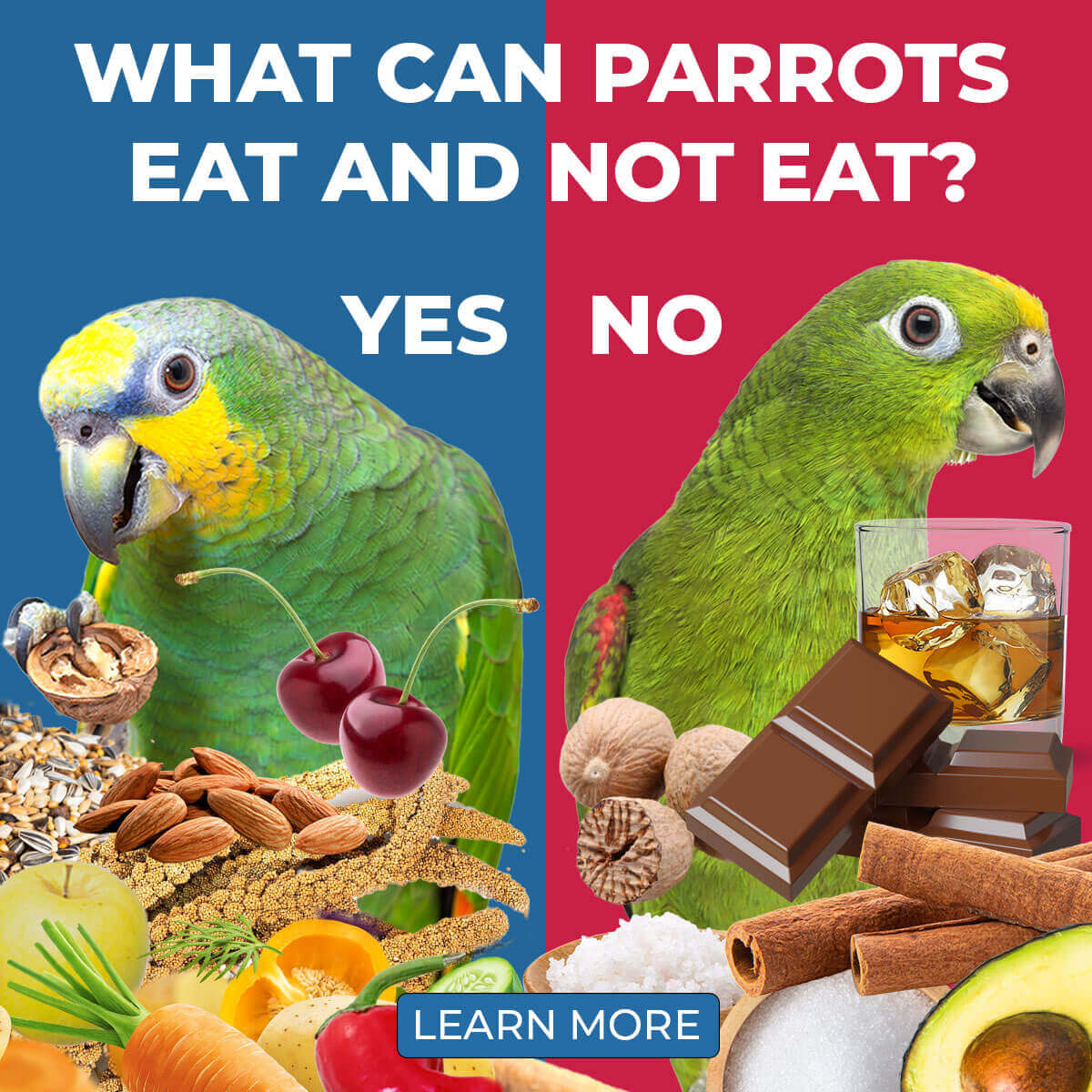
Credit: parrotessentials.co.uk
Grains And Seeds
Parrots need a balanced diet to stay healthy. Grains and seeds are a major part of their nutrition. This section covers the best grains and seeds for parrots.
Recommended Grains
Grains provide essential nutrients for parrots. Here are some recommended grains:
- Brown Rice: Rich in fiber and vitamins.
- Oats: Good for energy and digestion.
- Quinoa: High in protein and amino acids.
- Barley: Contains important minerals.
- Millet: Easy to digest and packed with nutrients.
Safe Seeds
Seeds are a favorite for many parrots. They should be safe and healthy. Here are some safe seeds:
- Sunflower Seeds: Rich in healthy fats and proteins.
- Pumpkin Seeds: High in vitamins and minerals.
- Safflower Seeds: Great for heart health.
- Hemp Seeds: Provide essential fatty acids.
- Chia Seeds: Packed with omega-3 fatty acids.
Always ensure the seeds are fresh and free from mold.
Proteins For Parrots
Proteins are vital for a parrot’s health. They help in muscle development and repair. A balanced diet with adequate proteins ensures your parrot stays active and healthy.
Animal-based Proteins
Animal-based proteins are essential for your parrot’s diet. They offer high-quality nutrients. Here are some safe animal-based protein sources for parrots:
- Boiled Eggs: Rich in protein and easy to digest.
- Cooked Chicken: Always ensure it’s plain and free from spices.
- Fish: Choose boneless fish, cooked without any seasoning.
These sources should be given in moderation. Overfeeding can lead to obesity and other health issues.
Plant-based Proteins
Plant-based proteins are also crucial for parrots. They provide a variety of nutrients. Here are some excellent plant-based protein options:
| Food | Benefits |
|---|---|
| Beans | High in protein and fiber. |
| Lentils | Rich in protein and iron. |
| Quinoa | Complete protein source with all essential amino acids. |
Ensure these foods are cooked properly. Raw beans and lentils can be harmful to parrots.
Treats And Snacks
Parrots love treats and snacks just like us. Giving them treats can make them happy and healthy. But it’s important to know what is safe for them to eat. Let’s explore some healthy treats and foods to limit for your parrot.
Healthy Treats
Parrots enjoy a variety of healthy treats. These treats provide essential nutrients and keep them active.
- Fruits: Apples, bananas, and grapes are great options. Always remove the seeds and pits.
- Vegetables: Carrots, broccoli, and bell peppers are nutritious. Chop them into small, bite-sized pieces.
- Nuts: Almonds, walnuts, and pecans are loved by parrots. Offer them in moderation.
Here is a table of healthy treats for your parrot:
| Fruit | Vegetable | Nuts |
|---|---|---|
| Apples | Carrots | Almonds |
| Bananas | Broccoli | Walnuts |
| Grapes | Bell Peppers | Pecans |
Foods To Limit
Some foods should be given in limited amounts to parrots. These foods might be tasty but can be harmful if eaten too much.
- Seeds: Seeds are high in fat. Give them occasionally.
- Certain fruits: Avocado and mango should be limited. They can be harmful in large amounts.
- Dairy products: Cheese and milk are not suitable for parrots. They have difficulty digesting dairy.
Avoid giving your parrot these foods regularly:
- Seeds
- Avocado
- Mango
- Cheese
- Milk
Remember, treats and snacks should make up only a small part of their diet. Always provide a balanced diet for a healthy and happy parrot.
Foods To Avoid
Feeding your parrot the right foods is crucial for its health. Some foods can be harmful or even fatal. This section highlights foods you should never give to your parrot.
Toxic Foods
Some foods are toxic to parrots and must be avoided at all costs. Here are some of the most dangerous:
- Avocado: Contains persin, which is harmful to parrots.
- Chocolate: Theobromine and caffeine are toxic to birds.
- Alcohol: Even small amounts can be deadly.
- Caffeine: Found in coffee, tea, and soft drinks, it’s toxic.
- Onions and Garlic: Can cause digestive issues and blood disorders.
Common Allergens
Some foods can cause allergic reactions in parrots. Here are some common allergens to watch out for:
- Peanuts: Can cause severe allergic reactions and mold contamination.
- Dairy Products: Birds are lactose intolerant and can get sick.
- Wheat: Some birds are allergic to wheat products.
- Seeds: Some seeds can cause allergies and should be limited.
Knowing which foods to avoid helps keep your parrot healthy and happy.
Creating A Balanced Diet
Parrots need a balanced diet for a happy, healthy life. Providing the right nutrients ensures they stay active and vibrant. This guide will help you understand how to create a balanced diet for your parrot.
Daily Feeding Routine
A daily feeding routine is essential for parrots. It helps them get all the nutrients they need. Follow this simple guide for a balanced diet:
| Time | Food Type | Details |
|---|---|---|
| Morning | Fresh Fruits and Vegetables | Provide a mix of colorful fruits and veggies. |
| Midday | Pellets | Offer high-quality parrot pellets. |
| Evening | Seeds and Nuts | Give a small amount as a treat. |
Always provide fresh water. Change it daily to ensure cleanliness.
Signs Of Nutritional Deficiency
Knowing the signs of nutritional deficiency helps you keep your parrot healthy. Look out for these signs:
- Feather Plucking
- Weight Loss
- Lethargy
- Poor Feather Quality
- Changes in Droppings
If you notice any of these signs, adjust your parrot’s diet. Consult a vet if necessary.
Keep an eye on your parrot’s behavior and physical condition. A balanced diet is key for their well-being.
Conclusion
Providing a balanced diet for your parrot is essential. Ensure they have fresh fruits, vegetables, and grains daily. Avoid feeding them toxic foods like chocolate and avocado. A well-nourished parrot will be healthier and happier. Remember to consult your vet for specific dietary needs tailored to your parrot.
Ryan Everhart is a passionate bird enthusiast and blogger, primarily writing on his website, Avian Whispers. His journey into the world of bird blogging began with a deep interest in parrots, a species that captivated his attention for their intelligence and social behavior. Over time, his content expanded to cover a broader range of bird species, offering insights into bird behavior, care, habitats, and conservation.
Ryan is dedicated to educating his audience, which includes both new bird owners and seasoned enthusiasts. His writing is filled with personal experiences, expert knowledge, and practical advice on bird care. Through Avian Whispers, he aims to foster a deeper appreciation for birds, emphasizing their role in nature and the joys of having them as pets.
Starting with articles focused on parrots, Ryan’s work now encompasses a diverse range of topics such as feeding, training, habitat enrichment, and bird health. His love for birds extends beyond parrots, diving into various avian species. His informative and heartfelt writing reflects his commitment to the well-being of birds and the desire to help others connect with these creatures.
As a growing voice in the bird blogging community, Ryan strives to provide a platform where bird lovers can learn, share experiences, and connect over a shared passion for avian life. His blogs are not only educational but also serve as a reminder of the importance of protecting and nurturing the bond between humans and birds.

